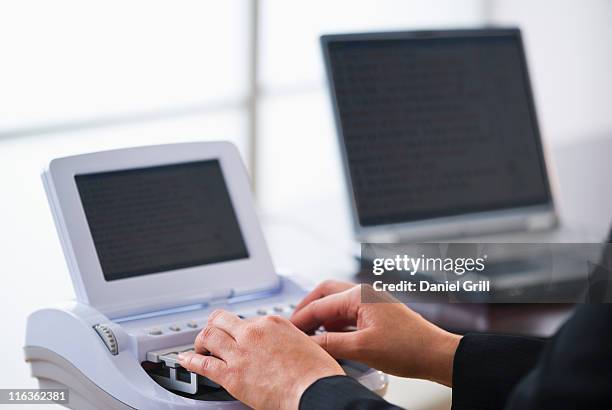Recognizing the Duty of a Court Typist: Trick Duties and Job Course Insights
As a court typist, you play a vital role in the judicial system, ensuring that every word spoken in court is accurately caught. Your responsibilities surpass just inputting; they include handling delicate documents and preserving strict privacy. Understanding your responsibilities is crucial to guiding with this profession successfully. However what qualifications and skills do you really need to succeed, and what occupation courses can you go after? Let's explore.
Overview of the Court Typist Role
A court typist plays a vital duty in the lawful system, making sure that all talked process are precisely documented. You're the one who catches the subtleties of court discussion, translating spoken exchanges into created documents - court typist. This isn't nearly typing; it has to do with understanding the complexities of lawful language and treatments. You often function under pressure, requiring to keep focus while deadlines loom.Your focus to information is critical, as even the smallest error can have significant ramifications. You have to also know with the technology utilized in courts, from dictation tools to transcription software.Moreover, you belong to a larger group, collaborating closely with judges, attorneys, and other court officials. Your work adds to the transparency and stability of the judicial procedure. Comprehending your duty assists you value the effect you carry guaranteeing justice is offered via exact documentation
Secret Responsibilities of a Court Typist
While you could assume the function of a court typist is entirely about keying, it incorporates a variety of essential obligations that guarantee the lawful procedure runs smoothly. You'll be responsible for recording hearings, depositions, and trials accurately, guaranteeing every information is recorded. You'll also review and proofread papers for errors, keeping a high degree of accuracy and clarity.In addition to transcription, you'll organize and file lawful papers, making them easily accessible for attorneys and judges. You might need to assist in preparing case documents and upgrading documents as required. Efficient communication is important, as you'll often team up with legal workers to clear up info or collect essential details.Your function likewise includes handling target dates, so timely completion of documents is vital. By meeting these responsibilities, you play a vital part in ensuring and sustaining the judicial system that legal process are recorded appropriately.
Essential Abilities for Court Typists
Effective court typists have a distinct set of skills that enhance their capability to do efficiently in a hectic lawful environment. Primarily, strong inputting skills are vital; you'll require to kind rapidly and precisely to stay on top of court proceedings. Attention to detail is crucial, as even minor mistakes can have significant consequences.You needs to also have a solid understanding of lawful terms, which enables you to precisely keep and transcribe documents quality. Outstanding business skills are essential for handling numerous situations and making sure target dates are met.Moreover, great communication abilities assist you engage successfully with judges, attorneys, and other court workers. Versatility is vital; you'll usually experience unforeseen circumstances that call for fast thinking and analytic. By honing these essential skills, you'll position yourself for success as a court typist in the legal area.
Educational Certifications and Educating

To end up being a successful court typist, you'll need a solid instructional history, often consisting of a secondary school diploma or matching. Relevant keying qualifications can enhance your qualifications and enhance your work potential customers. Additionally, on-the-job training opportunities can aid you obtain the useful abilities necessary for this role.
Essential Educational History

Appropriate Keying In Qualifications
While having a solid educational structure is necessary, obtaining pertinent inputting accreditations can considerably improve your qualifications as a court typist. Accreditations like the Qualified Expert Secretary (CPS) or the Registered Expert Secretary (RPS) demonstrate your efficiency and dedication to the occupation. These qualifications not only verify your inputting speed and precision but also showcase your understanding of lawful terminology and record format vital in court settings. Furthermore, pursuing specialized courses in lawful transcription can additionally improve your skills, making you a much more affordable candidate. By purchasing these certifications, you reveal prospective companies your dedication to quality and your preparedness to take care of the needs of a court typist role effectively. This positive method can greatly enhance your profession prospects.
On-the-Job Training Opportunities
As you begin your trip to end up being a court typist, on-the-job training uses important experience that complements your official education. You'll likely begin in a supportive duty, stalking seasoned typists and discovering the ropes of court procedures, terms, and software application. This hands-on experience aids you create vital skills, such as exact transcription and time management.Many courts give structured training programs that permit you to practice under genuine problems, improving your confidence and performance. You'll likewise get accustomed to different lawful records and courtroom methods, giving you a benefit in your job. Welcome these chances, as they'll not only fine-tune your inputting abilities however likewise develop your professional network within the lawful area, establishing you up for future success.
Job Path and Advancement Opportunities
Court typists usually find themselves on a promising occupation course with numerous advancement chances. As you obtain experience and boost your abilities, you might move into roles like lead you could try these out typist or supervisor, supervising a team of typists. With additional training, you might focus on lawful transcription or court reporting, which commonly provides greater salaries and greater responsibilities.You might likewise consider seeking certifications that can establish you aside from the competitors. Connecting with lawyers can open doors to advanced placements, such as management roles in law practice or court staff positions.As you continue to develop your knowledge in lawful terms and innovation, opportunities in relevant fields like legal assistant work or legal support might additionally emerge. By being aggressive and seeking added training, you can significantly broaden your career choices and possibly move right into higher-level legal duties.
The Relevance of Precision in Legal Transcription
Since also a small mistake can change the definition of a file, accuracy in legal transcription is important. When you're recording, your accuracy directly affects court procedures and can influence the outcomes of cases. By utilizing the right devices, you can boost your precision and guarantee that every information is captured properly.
Accuracy in Lawful Records
The accuracy of files typically makes the distinction between an instance shed or won when you assume concerning the legal system. As a court typist, you are in charge of recording lawful procedures with outright accuracy. Every word, punctuation mark, and formatting detail matters. A solitary error can bring about misconceptions, false impressions, and even endanger a client's case. You need to stay focused, pay attention diligently, and have a detailed understanding of legal terminology. Furthermore, keeping discretion is essential, as you manage sensitive details. Your duty isn't practically inputting; it's concerning making sure the honesty of legal documents. By sharpening your skills and focusing additional hints on accuracy, you add greatly to the performance of the lawful system and the search of justice.
Influence On Court Procedures
The success of court procedures rests on the precision of lawful transcription. Every word matters when you record court hearings. A solitary error can result in misconceptions, impacting the outcome of instances. If you misunderstand an essential statement or misspell a crucial term, it can transform the entire context of the dialogue. Judges, lawyers, and courts depend on your job to make informed choices based upon the evidence provided. Your attention to information assurances that the authorities document mirrors truth procedures, offering quality and accountability. By preserving high requirements in your transcription, you contribute substantially to the integrity of the lawful procedure. Eventually, your role is critical in promoting justice and guaranteeing that every voice is accurately represented in court
Tools for Accurate Transcription
To toenail accurate transcription in the court, you need the right devices at your fingertips. A top quality transcription software can greatly boost your performance, allowing you to record every word specifically. Spend in a reputable headset to strain background noise and guarantee quality in audio recordings. A foot pedal can likewise expedite your operations, allowing you regulate playback hands-free. In addition, maintaining a substantial legal thesaurus or glossary aids you rapidly reference terminology, ensuring you don't miss vital information. It's important to have a comfortable, ergonomic workstation to lessen disturbances and fatigue during long sessions. By outfitting on your own with these vital devices, you'll boost your accuracy and add efficiently to view it the legal process.
Work Setting and Job Overview for Court Typists
Court typists thrive in dynamic atmospheres, commonly located within lawful offices or dynamic court houses. You'll find yourself bordered by lawyers, from lawyers to judges, all working together to guarantee justice is offered (court typist). Your work space might be hectic, needing you to adapt quickly to differing needs, whether it's transcribing court procedures or preparing lawful documents.As for the task outlook, the demand for court typists stays constant because of the recurring need for precise documents in legal setups. While technology has actually automated some transcription tasks, proficient court typists that can manage intricate lawful terms and preserve precision are still extremely valued. Several typists additionally have opportunities for innovation within the lawful area, progressing right into duties such as legal secretaries or administrative assistants. Your focus to information and ability to work under stress will be important for your success in this considerable duty
Regularly Asked Concerns
What Devices or Software Program Do Court Typists Commonly Make Use Of?
Court typists commonly use transcription software application, word cpus like Microsoft Word, and specialized court coverage devices. You'll likewise count on foot pedals and top notch headsets to enhance accuracy and effectiveness in your transcription jobs.
Just How Does One Discover Work Openings for Court Typists?
To find task openings for court typists, examine on the internet task boards, lawful sites, and court system career web pages. Connecting with professionals in the area can also result in unadvertised opportunities you might not uncover or else.

What Is the Average Salary for a Court Typist?
The average salary for a court typist differs by location and experience, yet you can anticipate it to range from $35,000 to $55,000 each year. Research regional task listings to obtain a much better feeling of incomes.
Exist Certifications Available for Court Typists?
Yes, there are qualifications available for court typists. You can seek professional programs that enhance your abilities, like lawful transcription or court coverage certifications, which can improve your career opportunities and credibility in the field.
Can Court Typists Work From Another Location or Freelance?
Yes, court typists can work remotely or freelance, specifically with advancements in innovation. You'll discover possibilities in transcription services or legal firms that permit versatile work arrangements, adapting to your routine and preferences. As a court typist, you play an important role in the judicial system, making sure that every word spoken in court is precisely caught. Networking with legal specialists can open up doors to much more innovative positions, such as management duties in regulation firms or court clerk positions.As you continue to construct your knowledge in lawful terminology and innovation, chances in relevant fields like legal assistant work or legal help may likewise develop. Your work space might be fast-paced, requiring you to adapt swiftly to differing demands, whether it's transcribing court proceedings or preparing lawful documents.As for the work overview, the need for court typists stays steady due to the ongoing demand for accurate documentation in legal settings. Court typists generally make use of transcription software, word cpus like Microsoft Word, and specialized court reporting tools. To find task openings for court typists, examine on the internet work boards, lawful websites, and court system occupation web pages.